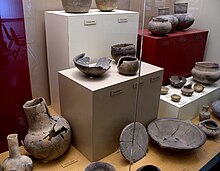
Back Nova arqueologia Catalan Procesuální archeologie Czech New Archaeology German Arqueología procesual Spanish Protsessuaalne arheoloogia Estonian Archéologie processuelle French New Archaeology Italian Processuele archeologie Dutch Prosessuell arkeologi NN Prosessuell arkeologi NB
This article may be too technical for most readers to understand. (August 2021) |

Processual archaeology (formerly, the New Archaeology) is a form of archaeological theory. It had its beginnings in 1958 with the work of Gordon Willey and Philip Phillips, Method and Theory in American Archaeology, in which the pair stated that "American archaeology is anthropology, or it is nothing" (Willey and Phillips, 1958:2), a rephrasing of Frederic William Maitland's comment: "My own belief is that by and by, anthropology will have the choice between being history, and being nothing."[1] The idea implied that the goals of archaeology were the goals of anthropology, which were to answer questions about humans and human culture. This was meant to be a critique of the former period in archaeology, the cultural-history phase in which archaeologists thought that information artifacts contained about past culture would be lost once the items became included in the archaeological record. Willey and Phillips believed all that could be done was to catalogue, describe, and create timelines based on the artifacts.[2]
Proponents of processual archaeology claimed that the rigorous use of the scientific method made it possible to get past the limits of the archaeological record and to learn something about the lifestyles of those who created or used artifacts. Colin Renfrew, a proponent of processual archaeology, observed in 1987 that it focuses attention on "the underlying historical processes which are at the root of change". Archaeology, he noted, "has learnt to speak with greater authority and accuracy about the ecology of past societies, their technology, their economic basis and their social organization. Now it is beginning to interest itself in the ideology of early communities: their religions, the way they expressed rank, status and group identity."[3]
- ^ Fisher, H. A. L.; Maitland, Frederic William. "The Collected Papers of Frederic William Maitland, vol. 3 (1911)". The Online Library of Liberty. Retrieved 2009-02-08.
- ^ Trigger, 1989:148
- ^ Colin Renfrew, Archaeology and Language: the puzzle of Indo-European origins 1987:6, and "6. Language, population and social organization: a processual approach" 120ff.
© MMXXIII Rich X Search. We shall prevail. All rights reserved. Rich X Search